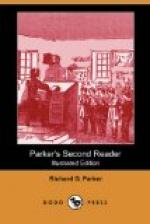8. “Rollo,” said he, “you have failed to-day. You have not been very idle, but have not been industrious; and the punishment which I have concluded to try first is, to give you only bread and water for dinner.”
9. So, when dinner-time came, and the family sat down to the good beef-steak and apple-pie which was upon the table, Rollo knew that he was not to come. He felt very unhappy, but he did not cry.
10. His father called him, and cut off a good slice of bread, and put into his hands, and told him he might go and eat it on the steps of the back door. “If you should be thirsty,” he added, “you may ask Mary to give you some water.”
11. Rollo took the bread, and went out, and took his solitary seat on the stone step leading into the back yard; and, in spite of all his efforts to prevent it, the tears would come into his eyes.
12. He thought of his guilt in disobeying his father, and he felt unhappy to think that his father and mother were seated together at their pleasant table, and that he could not come, because he had been an undutiful son. He determined that he would never be unfaithful in his work again.
13. He went on, after this, several days, very well. His father gave him various kinds of work to do, and he began, at last, to find a considerable degree of satisfaction in doing it.
14. He found, particularly, that he enjoyed himself a great deal more after his work than before; and, whenever he saw what he had done, it gave him pleasure.
15. After he had picked up the loose stones before the house, for instance, he drove his hoop about there with unusual satisfaction; enjoying the neat and tidy appearance of the road much more than he would have done, if Jonas had cleared it. In fact, in the course of a month, Rollo became quite a faithful and efficient little workman.
[Illustration]
LESSON LVIII.
The Comma.
THE COMMA is a mark like this =,=
When you come to a comma in reading, you must generally make a short pause. Sometimes you must use the falling inflection of the voice, when you come to a comma; and sometimes you must keep your voice suspended, as if some one had stopped you before you had read all that you intended. The general rule, when you come to a comma, is, to stop just long enough to count one.
EXAMPLES.
Diligence, industry, and proper improvement of time, are material duties of the young.
He is generous, just, charitable, and humane.
By wisdom, by art, by the united strength of a civil community, men have been enabled to subdue the whole race of lions, bears, and serpents.
[Sometimes a comma must be read like a question.]
Do you pretend to sit as high in school as Anthony? Did you read as correctly, articulate as distinctly, speak as loudly, or behave as well, as he?




